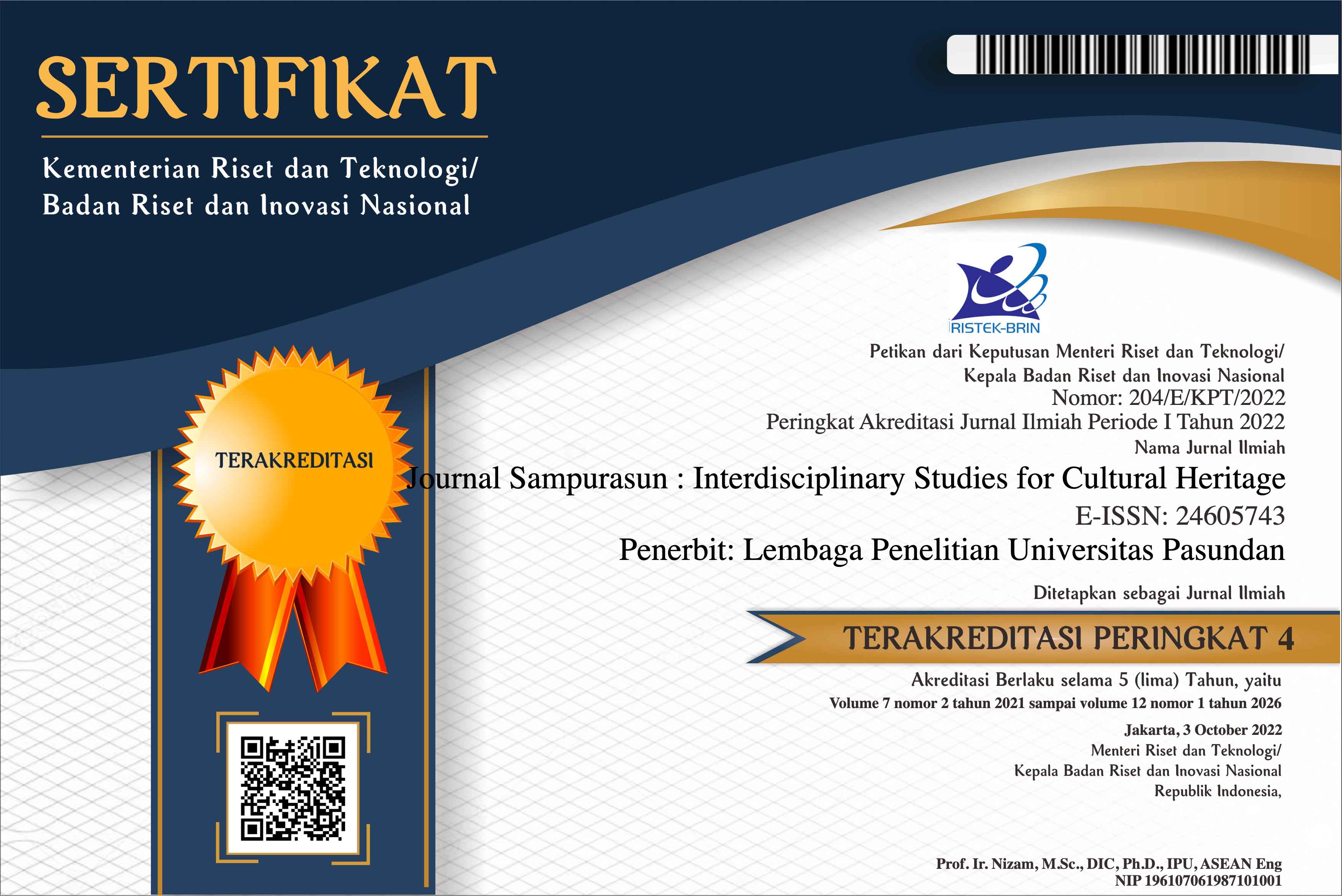Influence of Parent’s Behavior to the Children Awareness on the Environmental Preservation
DOI:
https://doi.org/10.23969/sampurasun.v1i1.22Abstract
The environmental conditions in Indonesia, especially those in the urban areas, have experienced very severe quality degradation. From the aspect of culture, the Indonesia people have inherited customs and traditions on preservation of their nature and environment. Tradition and cultures including values are usually transferred from parents to their children. In this research, a survey was conducted to investigate the influence of parents’ behavior on the children knowledge on the environmental preservation awareness. Respondents were selected from several elementary school students located near Cikapundung River, Bandung-Indonesia. Questionnaires were distributed to explore on how the students preserve the river located near their school. The research showed that the behavior ofthe parents had a weak positive correlation to the knowledge of the child in maintaining the environment, with the determination coefficient of 0.3. Local traditions or wisdom which tend to appreciate nature and environment have also been faded. As much as 46 percent of respondent believe that wastewater can be discharged directly to the river. This research result also conclude that not only the children’s environmental awareness that need to be increased, but their parents’ through official environmental education at school and upholding the local wisdoms in the community. With the involvement of other key stakeholders, the environmental education and the preservation of the local wisdom then can be maintained in the future.
Keywords: parents’ behavior, children awareness of environmental preservation
Downloads
References
References:
- Hayward, B., 2014. Children, Citizen, and Environment: Nurturing a Democratic Imagination in a Changing World, the Journal Environmental Education, 45(4), 258-260.
- Hsu, Shih-Jang, 2004. The Effect of an Environmental Education Program on Responsible Environmental Behavior and Associated Environmental Literacy Variables in Taiwanese College Students, The Journal of Environmental Education, Volume 35, 2, 2004.
- https://sepanjangjk.wordpress.com/2011/05/25/ke-bandung-jangan-lupa-gedung-merdeka
- https://mooibandoeng.wordpress.com/2013/12/05/ngaleut-inhoftank-01-12-13/)
- http://hijau.mafiaol.com/2013/12/kearifan-lokal-melestarikan-lingkungan.html)
- http://forumhijaubandung.wordpress.com/ (diakses Agustus 2014)
- http://muda.kompasiana.com/2013/01/12/ (diakses Agustus 2014)
- http://awig-awig.blogspot.jp/2011/07/jenis-kearifan-lokal-yang-ada-di.html
- http://ceritanyalisa.blogspot.jp/2013/11/pengelolaan-lingkungan-berbasis.html
- DevitaPermanasari. StudiEfektivitas Bank SampahSebagai Salah SatuPendekatanDalamMengelolaSampah yang BerbasisMasyarakat
Downloads
Published
Issue
Section
License
Copyright Notice
Authors should not withdraw their submitted papers because the withdrawal wastes voluntary works devoted by an associate editor and reviewers. But, we accept the withdrawal of a submitted paper if authors have unavoidable reasons. In the event that a manuscript is to be withdrawn from submission to Sampurasun Journal, a letter must be sent to the editorial office requesting withdrawal by e-mail (sampurasunjournal@unpas.ac.id) with its scanned PDF file, before the notification of acceptance for publication.
The withdraw request letter must include the following information. Paper ID, Paper title, Authors names, Reason why the paper must be withdrawn, and Date and signatures of all the authors (or signature of the contact author).
If only the contact author signs the letter, he/she must obtain the agreement of the withdrawal from all the other authors and the letter must include the description that all the other authors agreed the withdrawal. The journal will not withdraw a manuscript from peer review until such a letter has been received. Authors must not assume their manuscript has been withdrawn until they have received appropriate notification from the editorial office. Withdrawal of a manuscript subsequent to acceptance for publication will only be granted in the most exceptional of circumstances.
After the paper is accepted for publication, the withdrawal is not permitted in principle. The authors must always pay the charge even if the withdrawal is permitted. Any request of withdrawal that does not follow the above procedure is treated as invalid. If illegal submission, e.g., plagiarized or duplicate submission, is found for a paper, the withdrawal of the paper will never be permitted and the authors will be punished based on the rule. It is not acceptable practice to withdraw a manuscript in the event of acceptance at another journal. This constitutes dual submission. The editorial office of the other journal will be notified of your actions. In such circumstances Sampurasun ISCH may chose to impose appropriate punitive action subject.
Withdrawal Penalty
Author is not allowed to withdraw submitted manuscripts, because the withdrawal is waste of valuable resources that editors and referees spent a great deal of time processing submitted manuscript, money and works invested by the publisher. If author still requests withdrawal of his/her manuscript when the manuscript is still in the peer-reviewing process, author will be punished with paying $200 per manuscript, as withdrawal penalty to the publisher. However, it is unethical to withdraw a submitted manuscript from one journal if accepted by another journal. The withdrawal of manuscript after the manuscript is accepted for publication, author will be punished by paying US$500 per manuscript. Withdrawal of manuscript is only allowed after withdrawal penalty has been fully paid to the Publisher. If author don't agree to pay the penalty, the author and his/her affiliation will be blacklisted for publication in this journal. Even, his/her previously published articles will be removed from our online system.


















